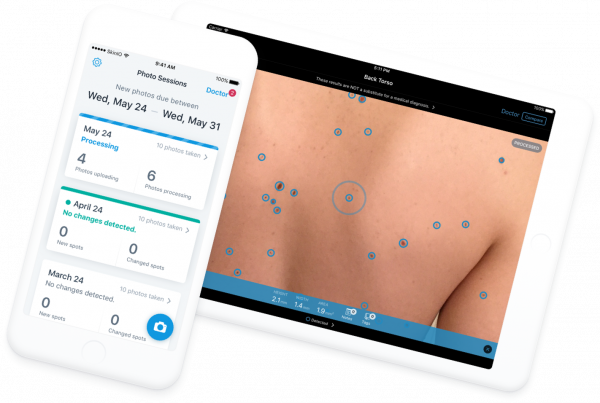
Virtual care has largely received attention in the area of primary care and behavioral health. But virtual specialty care is gaining ground as well, including in the world of dermatology, where accessing a specialist is not always easy.

With the Rise of AI, What IP Disputes in Healthcare Are Likely to Emerge?
Munck Wilson Mandala Partner Greg Howison shared his perspective on some of the legal ramifications around AI, IP, connected devices and the data they generate, in response to emailed questions.
Chicago-based startup SkinIO has developed a skin screening app that can help with the early detection of the most common form of cancer by first analyzing photos snapped with a smartphone. The technology has intrigued the Penn Medicine- and Capital Blue Cross-affiliated Smart Health Innovation Lab, which announced this week that the SkinIO has joined the healthcare technology accelerator.
SkinIO currently partners with mostly self-insured employer groups, as well as some payers like Capital Blue Cross, health systems and medical practices that provide the technology to members and patients. Lancaster, Pennsylvania-based iLab is a joint venture between Aspire Ventures, Capital Blue Cross, Clio Health and Penn Medicine Lancaster General Health. In joining the Lab, SkinIO is looking to get its technology into more people’s hands at a time when cancer screenings have dropped amid the pandemic, said Kyoko Crawford, co-founder and CEO of SkinIO.
The pandemic has led many more people to turn to virtual care, and insurers have been required to increase coverage of telehealth services. While that was a boon for health tech companies, it has reduced the number of routine screenings as patient and clinician concerns about Covid-19 transmission significantly reduced in-person visits including for preventive care. Research published last year in the Journal of the American Academy of Dermatology suggests Covid-19 has delayed diagnosis and treatment of skin cancer.
“Our technology is founded on this concept of full-body photography of skin,” Crawford said in a phone interview. “It is a critical focus.”
She noted that the app guides a person through taking photos of their skin by body region, like the head and shoulders, torso, trunk and legs. An artificial intelligence-powered image-processing algorithm zeroes in on moles, lesions and other markings on the skin, and the images are sent securely to SkinIO’s panel of board-certified dermatologists for review.
This is done for a third of the cost of a dermatology visit, Crawford said. “SkinIO can be done for well under $100 in-office or at-home, and for a patient, we’re deploying this so that it’s often a covered benefit.”
Follow-up, in-person care, for instance to evaluate a worrisome mole, is then scheduled as needed.
“If our reviewing dermatologists see something on the photos and results that needs to be looked at in person or likely biopsied, our customer care team connects that individual with appropriate dermatologists in their area to be seen,” Crawford said.
Instead of putting off screening because a person can’t get in to see a dermatologist, the portable technology allows people to begin the screening process conveniently.
“You get that peace of mind that you’re all clear or get expedited access to care and make sure the problem is taken care of sooner rather than later,” Kim Ireland, CEO of iLab, said by phone.
For SHIL, it was important to find a solution that was user-friendly, and SkinIO met that mark, she said. “This is a tool that we do feel like anybody can use because of how well they’ve designed the interface.”
Increasingly, health organizations are providing options for patients to do virtual skin checks, including to screen for cancer, and access tele-dermatology to have other skin conditions evaluated. Platforms and apps like Miiskin and UMSkinCheck also provide mole-mapping and full-body skin screening options.
Indeed there are companies like TytoCare that are aiming to have the annual physical done at home.
For its part, SkinIO positions itself as a comprehensive, AI-powered option that, at present, is primarily offered as a built-in benefit, most often for employees covered by self-insured group plans. The focus is on early detection at the company Crawford co-founded with Chicago-based dermatologist and skin cancer surgeon Dr. JC Lapiere, who successfully treated her father-in-law for melanoma after a tiny problematic spot was found during a full-body skin exam. The melanoma was the size of a speck of black pepper and had gone unnoticed before the exam, she said.
“We realized here’s this specialty that even pre-pandemic was super inaccessible to most of the country unless you live in like midtown Manhattan or downtown Chicago,” Crawford said. “There are places that are complete deserts for dermatology, and we have this technology that a nurse at a community clinic, a clinical research coordinator in an RV doing remote screenings or a spouse or family member at home could use.”
Photo: SkinIO














